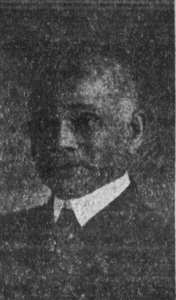
James Bowser
*James Bowser was born on this date in 1846. He was a Black journalist and educator.
James Dallas Bowser was born free in Weldon, North Carolina, to free people of color. When he was six, the family moved to Chillicothe, Ohio. Henry Bowser's father became one of the first Black teachers there. In the mid-1860s, Bowser moved to Kansas City and became a teacher. In 1868, Bowser was hired to succeed James Milton Turner, principal of the Lincoln School. He held that job for eleven years before moving outside the city to Wyandotte County, Kansas, where he took a position as principal of another school.
In 1873, he married Dora J. Troy of Xenia, Ohio. Bowser was active in Republican politics in Kansas for the rest of his life. In 1881, he was appointed as a mail carrier, a patronage position he held for four years until the new administration of Democratic President Grover Cleveland replaced Republican appointees. Bowser was a Republican State Central Committee member in 1885 and 1886. In 1887, he was a sealer of weights and measures in Kansas City. In the 1900s, he also worked as a principal at Attucks School in Kansas City. In 1880, H. H. Johnson founded The Free Press in Kansas City but could only afford a single issue. Johnson solicited the aid of Bowser, and Bowser took control of the paper, starting with its second issue. He renamed it the Gate City Press and became its editor.
The paper was very successful and attracted well-known writers. William Ward Yates (husband of Josephine Silone Yates) and G. N. Gresham were associate editors of the paper. In 1886, Bowser hosted activist and journalist Ida B. Wells when she visited Kansas City for the National Teachers Association meeting. Shortly after, Bowser suggested that Wells apply for a teaching position in Kansas, saying she could write for his newspaper. Wells decided to settle in Memphis. Bowser continued to publish the paper until 1889.
In 1899, Bowser published a poem in response to Rudyard Kipling's "The White Man's Burden." Bowser entitled his work "Take up the Black Man's Burden," writing: "Take up the Black Man's burden/Send forth the best ye breed, /To judge with righteous judgment/The Black Man's work and need, //...//Let the glory of your people/Be the making of great men, /The lifting of the lowly, /To noble thought and aim." He drew connections between racism and imperialism in the poem and criticized both.
He also advocated black self-improvement, a position expressed by Booker T. Washington, president of the Tuskegee Institute. The poem is often paired with several poems written in response to Kipling, particularly "Charity Begins at Home," published a few weeks earlier in the Colored American and pseudonymously written by "X-Ray."
It was more biting in its criticism. Bowser continued to work on issues of civil rights for Blacks. In 1920, he was nominated by the NAACP and the Colored Civic League to become a member of the Citizen's League of Kansas City Inter-Racial Committee. The bi-racial committee included six black and six white members: Nat Spencer, L. A. Halbert, Walter Matscheck, O. J. Hill, R. M. Maxwell, B. M Stigall, Bowser, William Alphian, S. W. Bacote, R. T. Coles, John Love, and Frank Neal. The organization worked with the city to diffuse racial violence and improve black housing conditions.
In 1921, Bowser published a poem, "O Darkest Tulsa," lamenting the terrible Tulsa Race Riot. The poem was published in the Kansas City Sun on October 1, 1921. That same year, Bowser attended the NAACP national convention in Detroit. Later in his life, he was president of the Old Settlers' Association of Kansas City, wrote and told stories about the city's history, and was a member of the Presbyterian Church and a Freemason. James Bowser died at his home in Kansas City in January 1923.